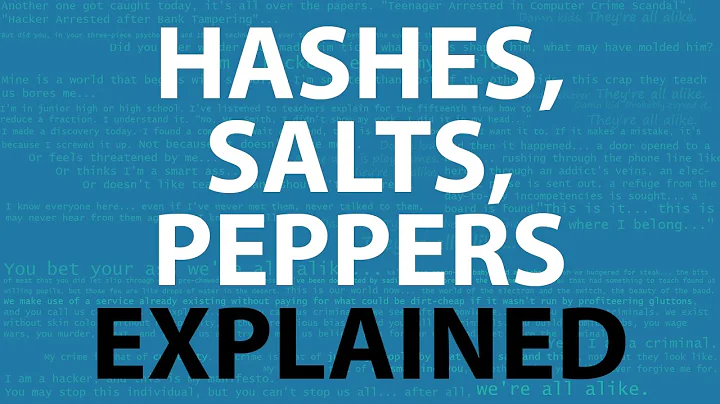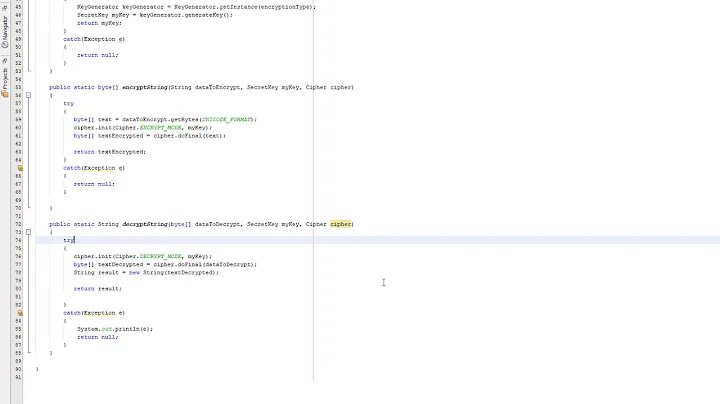Simple encryption in java-no key/password
Solution 1
I know its overkill but i would use jasypt library since its realy easy to use. All you need is random seed to encrypt or decrpyt.
Here is the source code for encrypting data:
String seed = "ipNumber";
String myIpValue = "192.168.0.1";
StandardPBEStringEncryptor encryptor = new StandardPBEStringEncryptor();
encryptor.setPassword(seed);
String encrypted= encryptor.encrypt(myIpValue);
And for data decryption:
StandardPBEStringEncryptor encryptor = new StandardPBEStringEncryptor();
encryptor.setPassword(seed);
String decrypted = encryptor.decrypt(encrypted);
Or you could just encode or decode your string to base64 example is show here: Base64 Java encode and decode a string
Solution 2
Almost the same as higuaro solutions but with a lot of fixes to make it work, the following code tested and working since higuaro not working well like characters went into numbers and when you reverse its get single number and damage everything:
public String caesarCipherEncrypt(String plain) {
String b64encoded = Base64.getEncoder().encodeToString(plain.getBytes());
// Reverse the string
String reverse = new StringBuffer(b64encoded).reverse().toString();
StringBuilder tmp = new StringBuilder();
final int OFFSET = 4;
for (int i = 0; i < reverse.length(); i++) {
tmp.append((char)(reverse.charAt(i) + OFFSET));
}
return tmp.toString();
}
To de-crypt procede backwards:
public String caesarCipherDecrypte(String secret) {
StringBuilder tmp = new StringBuilder();
final int OFFSET = 4;
for (int i = 0; i < secret.length(); i++) {
tmp.append((char)(secret.charAt(i) - OFFSET));
}
String reversed = new StringBuffer(tmp.toString()).reverse().toString();
return new String(Base64.getDecoder().decode(reversed));
}
I hope its helpful.
Solution 3
You can encode the ip String to base64, reverse the string, and then use a Caesar cipher:
public String easeyEncrypt(String ip) {
String b64encoded = Base64.getEncoder().encode(ip);
// Reverse the string
String reverse = new StringBuffer(b64encoded).reverse().toString();
StringBuilder tmp = new StringBuilder();
final int OFFSET = 4;
for (int i = 0; i < reverse.length(); i++) {
tmp.append(reverse.charAt(i) + OFFSET);
}
return tmp.toString();
}
To decrypt procede backwards:
public String easeyDecrypt(String secret) {
StringBuilder tmp = new StringBuilder();
final int OFFSET = 4;
for (int i = 0; i < secret.length(); i++) {
tmp.append(secret.charAt(i) - OFFSET);
}
String reversed = new StringBuffer(tmp.toString()).reverse().toString();
return Base64.encode(reversed);
}
Solution 4
This is simplest encrypt/decrypt code but it is not secure.
String strip = "192.168.1.11";
byte[] encryptArray = Base64.encodeBase64(strip.getBytes());
String encstr = new String(encryptArray,"UTF-8");
System.out.println("Enc >> "+ encstr);
String strDec = "MTkyLjE2OC4xLjEx";
byte[] dectryptArray = strDec.getBytes();
byte[] decarray = Base64.decodeBase64(dectryptArray);
String decstr = new String(decarray,"UTF-8");
System.out.println("Dec >>> "+ decstr);
For this you have to import org.apache.commons.codec.binary.Base64;
you can Download org-apache-commons-codec.jar file from Link
Solution 5
If the generated string would be "random", then your application would have to keep track of any generated string for all time. Probably not a good design.
A fast poor man "encryption" would be ROT47 ( http://rot47.net/ )
Related videos on Youtube
Mayukh Nair
Still figuring out what I even specialize in. Interested in human-computer interaction, data, and machine learning.
Updated on July 05, 2022Comments
-
Mayukh Nair almost 2 years
Say I have an IP address, 192.168.1.1
I want my program to create a random one-word string based on this IP address which can be easily decrypted without a key or password or additional security.
eg.
I enter 192.168.1.1
Program converts it to AzlQrEHCSD or some other random string
I enter this string in the program
It gets converted back to 192.168.1.1
Is there any simple algorithm that can do this without generating stuff like keys or additional passwords? I understand that keys and passwords are a must for encryption and decryption, but my scenario does not require it.
-
 Scary Wombat over 9 yearsHow about Base64 encoding?
Scary Wombat over 9 yearsHow about Base64 encoding? -
Alex Salauyou over 9 yearsIt will be not encryption at all, just encoding. Convert your ip to bytes and apply base64 conversion
-
 Mathemats over 9 yearsxor encryption is fast and easy to implement.
Mathemats over 9 yearsxor encryption is fast and easy to implement.
-
-
Alex Salauyou over 9 yearsIt's for letters, not for decimals
-
 GhostCat over 9 yearsYes, you are correct. I actually thought of ROT47; but confused myself. ROT47 will work for numbers, too.
GhostCat over 9 yearsYes, you are correct. I actually thought of ROT47; but confused myself. ROT47 will work for numbers, too. -
Jagoda Gorus almost 7 yearsThere is no variable
keyin here:key.charAt(i), didn't you meansecret.charAt(i)? -
Al-Mothafar almost 7 years@JagodaSokół yes, ty
-
Jagoda Gorus almost 7 yearsWhat's more, I also changed:
Base64.getDecoder()toBase64.getMimeDecoder(), due toBase64: java.lang.IllegalArgumentException: Illegal charactererror and included your functions in my small university project :) -
 Hristo Stoyanov about 6 yearsFrom the wikipedia link: As with all single-alphabet substitution ciphers, the Caesar cipher is easily broken and in modern practice offers essentially no communication security
Hristo Stoyanov about 6 yearsFrom the wikipedia link: As with all single-alphabet substitution ciphers, the Caesar cipher is easily broken and in modern practice offers essentially no communication security -
 Roberto Rodriguez over 5 yearsSimple and easy.. Thanks!!
Roberto Rodriguez over 5 yearsSimple and easy.. Thanks!! -
 lance.dolan over 4 yearssince java 8, you can use the Base64 that is part of the JDK.
lance.dolan over 4 yearssince java 8, you can use the Base64 that is part of the JDK.java.util.Base64.getEncoder().encode(string.getBytes());







